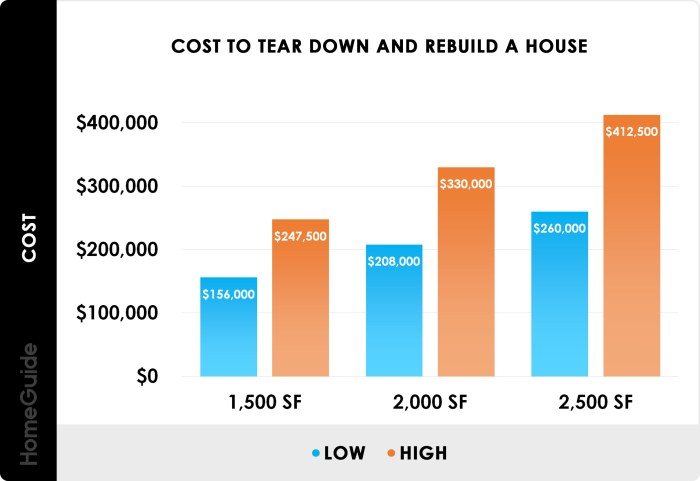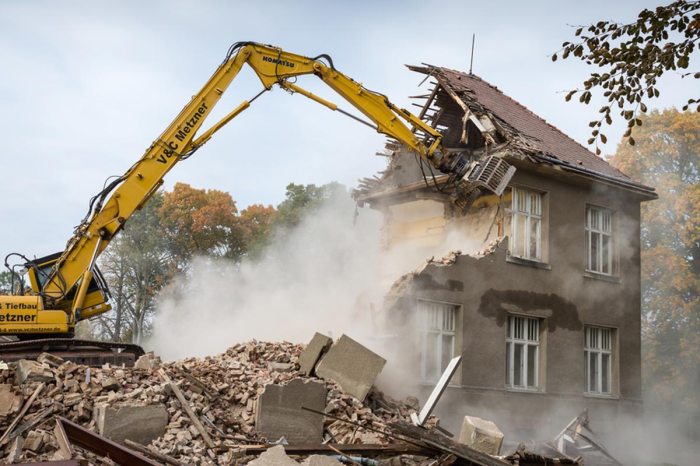Diving into the realm of home demolition and rebuilding costs, this introduction sets the stage for a comprehensive discussion on the various factors and strategies influencing expenses in this process.
Providing insights into the breakdown of costs and the comparison between demolition and rebuilding phases, readers will gain a deeper understanding of what goes into determining the overall expenses of such projects.
Factors Affecting Home Demolition and Rebuilding Cost
When it comes to the cost of demolishing and rebuilding a home, several key factors come into play. These factors can significantly impact the overall expenses involved in such a project. Factors such as location, size of the home, materials used, labor costs, project complexity, and additional services required all play a crucial role in determining the final cost.
Location
Location is a major factor that influences the cost of home demolition and rebuilding. Different regions have varying regulations, permit costs, and disposal fees. Urban areas may have higher labor costs and stricter building codes, leading to increased expenses compared to rural areas.
Size of the Home
The size of the home directly affects the cost of demolition and rebuilding. Larger homes require more materials, labor, and time to complete the project. As such, the square footage of the home is a significant determinant of the overall cost.
Materials Used
The choice of materials used in the rebuilding process can impact the cost. High-end materials are more expensive, while lower-cost options can help reduce expenses. Additionally, specialized materials or custom features can increase the overall budget.
Labor Costs
Labor costs play a crucial role in the total expenses of home demolition and rebuilding. Skilled labor is essential for a successful project, and hiring experienced professionals may come at a higher price. Factors such as labor availability and demand can also affect costs.
Project Complexity and Additional Services
The complexity of the project, such as structural modifications, site accessibility, or historical preservation requirements, can add to the overall cost. Additionally, the need for additional services like asbestos removal, site preparation, or landscaping can further impact the budget.
Cost Breakdown

When it comes to home demolition and rebuilding, it is essential to understand the breakdown of costs associated with each phase of the process. Demolition costs and rebuilding costs can vary significantly, so it is crucial to differentiate between the two to have a comprehensive overview of the expenses involved.
Demolition Costs
Demolition costs typically include expenses such as the labor required to tear down the existing structure, equipment rental, waste disposal, and any necessary permits. The average cost of demolition can range from $4,000 to $14,000, depending on the size of the home and the complexity of the demolition process.
Rebuilding Costs
On the other hand, rebuilding costs involve expenses related to constructing a new home on the cleared site. These costs can include materials, labor, permits, design fees, and any additional features or upgrades. The average cost of new construction can vary widely, ranging from $100 to $200 per square foot, depending on the location and the quality of materials used.By comparing the average costs for demolition with the costs of new construction, homeowners can better understand the financial implications of demolishing and rebuilding their home.
It is essential to budget for both phases of the process to ensure a successful and financially sound project.
Strategies to Reduce Demolition and Rebuilding Costs
When it comes to demolishing and rebuilding a home, cost-saving strategies can make a significant difference for homeowners. By implementing smart approaches, repurposing materials, and efficient project management, overall costs can be minimized.
Repurpose Materials and Structures
Repurposing materials and structures from the existing home can be a great way to reduce demolition and rebuilding costs. Salvaging items such as doors, windows, flooring, or even structural elements can help lower expenses significantly. By carefully assessing what can be reused or repurposed, homeowners can save money while adding unique character to the new construction.
Efficient Project Management
Efficient project management is key to reducing costs during demolition and rebuilding. By creating a detailed budget and timeline, homeowners can better track expenses and avoid unnecessary delays or overspending. Hiring experienced contractors and coordinating closely with them throughout the process can help streamline the project and prevent costly mistakes.
Optimize Budgeting
Optimizing budgeting is essential for minimizing overall costs. Homeowners should prioritize necessary expenses and avoid unnecessary upgrades or changes that can quickly inflate the budget. By carefully planning and budgeting for each phase of the project, homeowners can stay on track financially and ensure that the demolition and rebuilding process stays within their means.
Hiring Professionals vs. DIY Approach

When it comes to home demolition and rebuilding, homeowners often face the decision of whether to hire professionals or take on the project themselves. Both options have their own costs and benefits, as well as risks and challenges.
Costs and Benefits of Hiring Professionals
- Hiring professionals for home demolition and rebuilding can ensure that the work is done efficiently and accurately, potentially saving time and money in the long run.
- Experts have the necessary skills, experience, and equipment to handle the project effectively, reducing the likelihood of mistakes or accidents.
- Professional contractors may also have access to discounted materials and resources, which can help lower overall costs.
Risks and Challenges of DIY Approach
- DIY projects in home demolition and rebuilding can be risky, especially if homeowners lack the proper knowledge and skills required for such complex tasks.
- Mistakes made during a DIY project can lead to costly repairs and delays, ultimately increasing the overall expenses.
- Safety is also a concern when it comes to DIY demolition and construction, as handling hazardous materials or working with heavy machinery can pose serious risks.
When to Hire Professionals vs. DIY
- It is advisable to hire professionals for tasks that require specialized skills or knowledge, such as structural engineering, electrical wiring, or plumbing.
- Homeowners can consider handling simpler aspects of the project themselves, such as demolition of non-load-bearing walls or painting, to save on costs.
- Before deciding on a DIY approach, it is essential to assess one's own capabilities and limitations realistically to avoid potential pitfalls.
Final Conclusion
In conclusion, the journey through the intricacies of home demolition and rebuilding costs sheds light on the complexities and considerations involved in such endeavors. From cost-saving strategies to the decision-making process between hiring professionals and taking a DIY approach, this discussion aims to empower homeowners with valuable knowledge for their future projects.
User Queries
What factors can influence home demolition and rebuilding costs?
Factors like location, size of the home, materials used, and labor costs can significantly impact the overall expenses of the project.
How do the costs of demolition compare to those of rebuilding?
Demolition costs typically differ from rebuilding costs, with each phase having its own set of expenses. It's essential to understand the breakdown to plan effectively.
Are there ways to reduce home demolition and rebuilding costs?
Homeowners can explore cost-saving strategies like repurposing materials and efficient project management to minimize overall expenses.
When should homeowners consider hiring professionals for these projects?
It's advisable to hire experts for complex projects or when specific skills are required. DIY approaches can be suitable for smaller tasks or simpler projects.

























